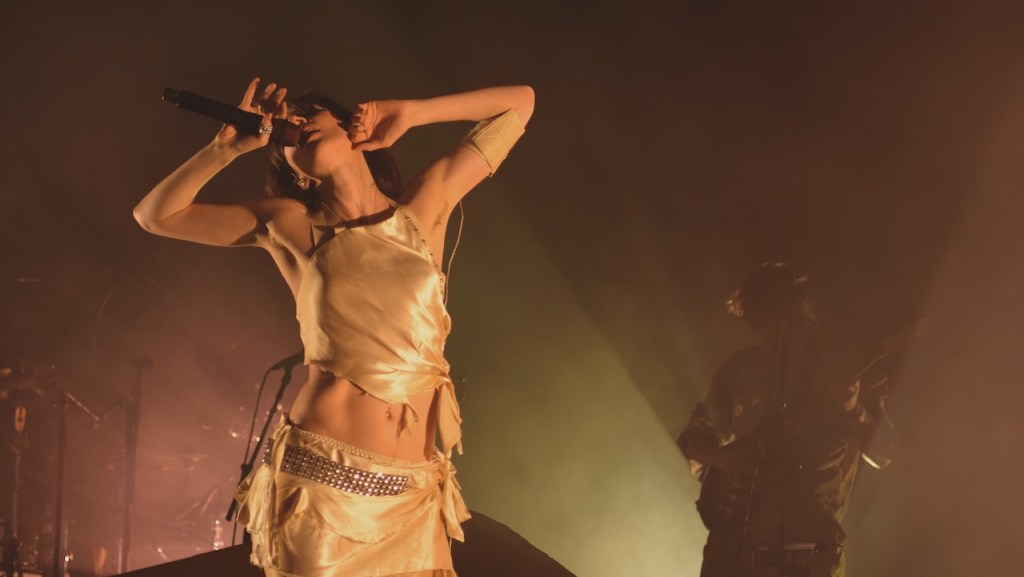We arrived at Meredith Music Festival on Friday afternoon to sunshine, humidity and temperatures in the mid-30s. Gusty winds were turning brand-new marquees into grottos and leaving a tent graveyard in their wake. Rain was on its way, and the prospect of 15 degrees and drizzle overhead had never sounded so good.
Despite the inhospitable conditions, a sense of calm permeated the amphitheatre as it filled up in time for Welcome to Country. We were asked to sit down and place our hands on Wadawurrung Country, to listen to the earth and skies above. In this moment, the anxious blur of festival prep and campsite set-up was supplanted by a grounding sense of unity.
The mind settled long enough for me to wonder, why were we here? To cast off the ties that bind our daily lives, perhaps, and embrace this privileged window of freedom in concert with thousands of kindred spirits, offering implicit and concrete support to friends old and new. And to let the music have its way with us.

A prime example of this came at 11 AM on Saturday. Many hundreds of people had made it out of their tents and down to the amphitheatre, most wearing raincoats, ponchos or holding umbrellas, while some had decided to surrender to the elements. Mary Lattimore was on stage, caressing, tickling and wrangling a harp.
Objectively, it would’ve been a strange phenomenon to witness; so many under-slept, groggy people emerging from their temporary accommodation to stand in the rain and mud and watch a woman pluck the strings of a harp. But while the dynamic range of Lattimore’s set was subtler than most of the weekend’s other acts, the performance was no less transfixing – a tranquil and emotional illustration of the power of live music.

Gut Health rose to the occasion mid-afternoon on Friday. Their set was rooted in what felt like one long, urgent bass riff that fed into Athina Uh Oh’s spat and squealed lead vocals. They’re an engrossing live act, generating an upbeat zaniness that recalled The B-52’s and Pylon. If they can manage to polish a song that cuts through the noise, big things await.
Miss Kaninna has a rare gift, seeming always to be exactly where she’s supposed to be. Her performance foregrounded the unsparing honesty and weapon-like confidence that underlies her two singles, ‘Blak Britney’ and ‘Pinnacle Bitch’. Kaninna finished with a cover of Bob Marley’s ‘One Love’, dedicated to the people of Palestine. “In our thousands, in our millions,” Kaninna shouted, “we are all Palestinians.”
After these two high points came a stretch of underwhelming guitar music. Floodlights sounded much like they do on record – an earnest Australiana pub rock throwback. While the quintet was wholly engaged, the songs lacked novelty, revolving around Louis Parsons’ impenetrable lead vocals and the vague sloganeering of his lyrics.
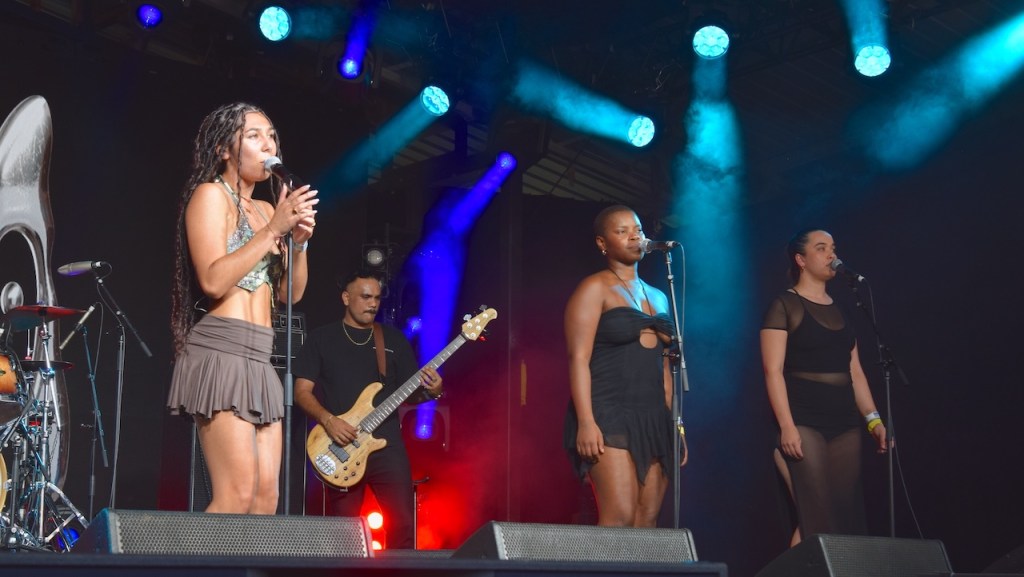
Alex G’s set was let down by its creator’s efforts to manufacture novelty. There were moments of singer-songwriter balladry, aughts emo and ill-judged hyperpop. Caroline Polachek joined G for ‘Mission’, an alt-country song that felt half-cooked and shallow, never mind the magnetic charisma of G’s guest.
Overcast skies had prevented us from cheering on the sunset. Some were speculating that the rain would blow right past us, ignoring the heft of the grey clouds above. Souls of Mischief brought back a feeling of cohesion. The Oakland hip hop crew were here celebrating 30 years of their debut album 93 ‘til Infinity. Meredith marked the anniversary tour’s 118th show, and rappers A-Plus, Phesto, Opio and Tajai gave the impression they’d be happy to keep the tour going for another hundred-plus shows.
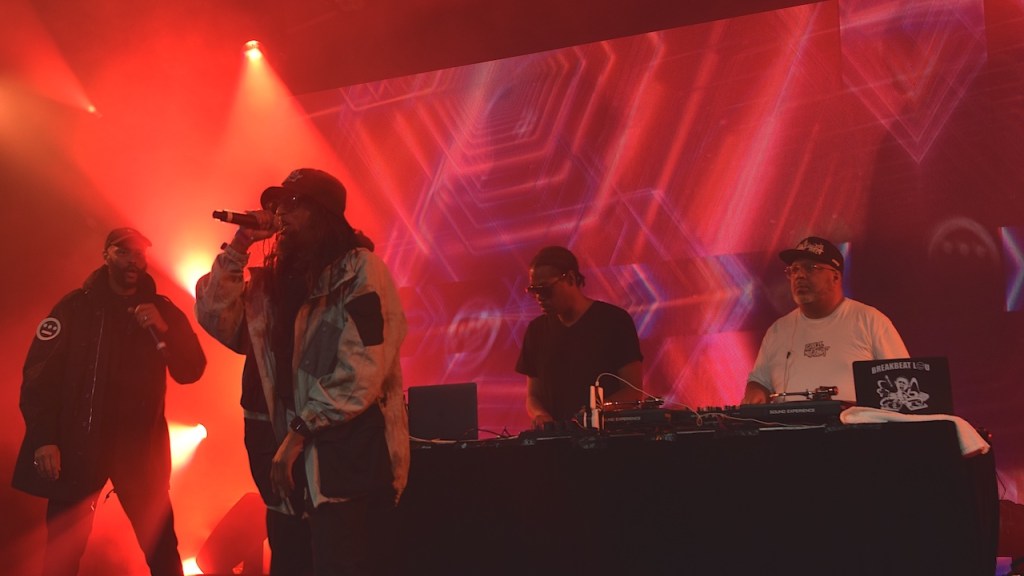
Caroline Polachek has been releasing music for the better part of two decades. Her latest album, this year’s Desire, I Want to Turn Into You, is the apotheosis of her career’s work, knitting together elements of soft rock, sophisti-pop, turn-of-the-’10s indie rock and contemporary chart music while remaining lean and infectious.
Material from Desire dominated the setlist, alongside a few choice selections from 2019’s Pang, making for an absorbing performance that ranks among the great Meredith sets of all time. Boots were in the air throughout, the enactment of a Meredith tradition that represents an individual’s overwhelming fondness for the artist on stage.
The affection went both ways: early in the show, Polachek remarked that Meredith was giving Glastonbury a run for its money. Midway through the set, she told us about a recent visit to a Japanese Shinto shrine. “I was overcome by a sensation that many good things had happened there,” she said. “When I got here tonight, I had the same feeling.”
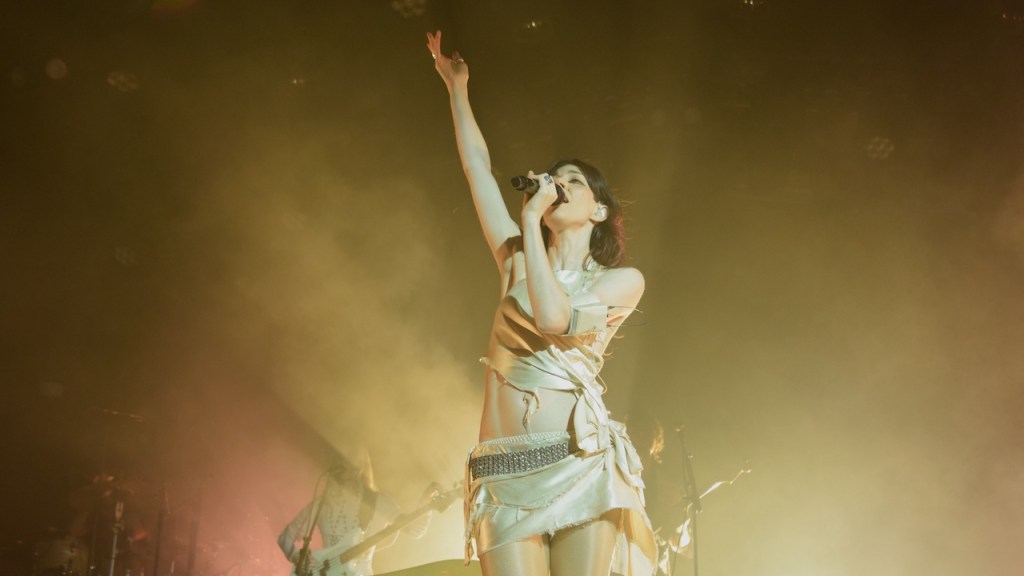
Perhaps because of Polachek’s radiant brilliance, once the rain started to fall, no one seemed the least bit perturbed. 30/70 did as requested, giving us a set of jazzy and percussive funk and soul with R&B background vocals. Flowdan took his time arriving onstage, letting DJ Karnage warm up the crowd for a brief but powerful set of OG grime and dubstep.
“Where are we?” asked Flowdan, making me think he might’ve got confused by the midnight drive through the Victorian countryside. “We’re in Badman City,” he affirmed. The MC’s bassy voice linked with the shuddering low frequencies of Karnage’s beats, stretching the limits of the festival’s subwoofers.
Dameeeela doubled down on the turf-crunching bass lines and sonic intensity of Flowdan’s set, firing through an hour of hard techno while perched on a bed in lieu of the customary DJ booth. Blawan has become one of industrial techno’s leading proponents over the last decade, and those still up for his 3 AM set were sufficiently smashed to bits, including the people riding the Meredith Eye Ferris wheel, which offered momentary relief from the pouring rain.
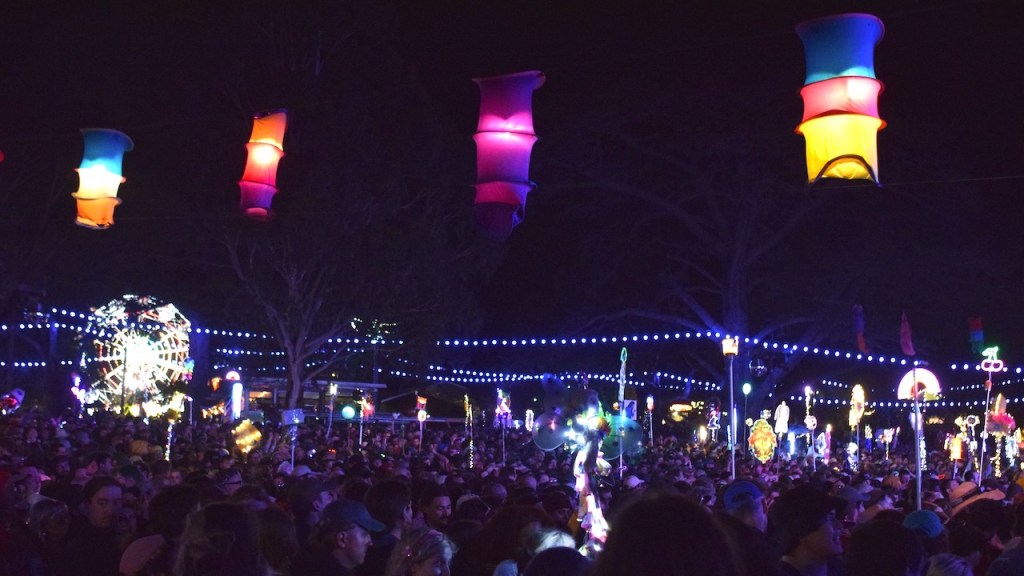
Rain continued to lash our tents through the night, causing some people to wake up in soggy sleeping bags next to unwelcome puddles. Optimism that the skies would clear was retained, but people weren’t about to take cover and wait it out, as evidenced by the bonny turnouts for Watty Thompson’s rambling display of mystic country and Bumpy’s set of high class neo-soul.
By the time André Gainey and Vonne Parks of They Hate Change took the stage, the amphitheatre was near-full. The duo of MCs and electronic producers from Florida’s Gulf Coast were relatively unknown in Australia before this trip, but they built such rapport with the Meredith audience during their grinning, high-energy set that you’d have thought they were local heroes.
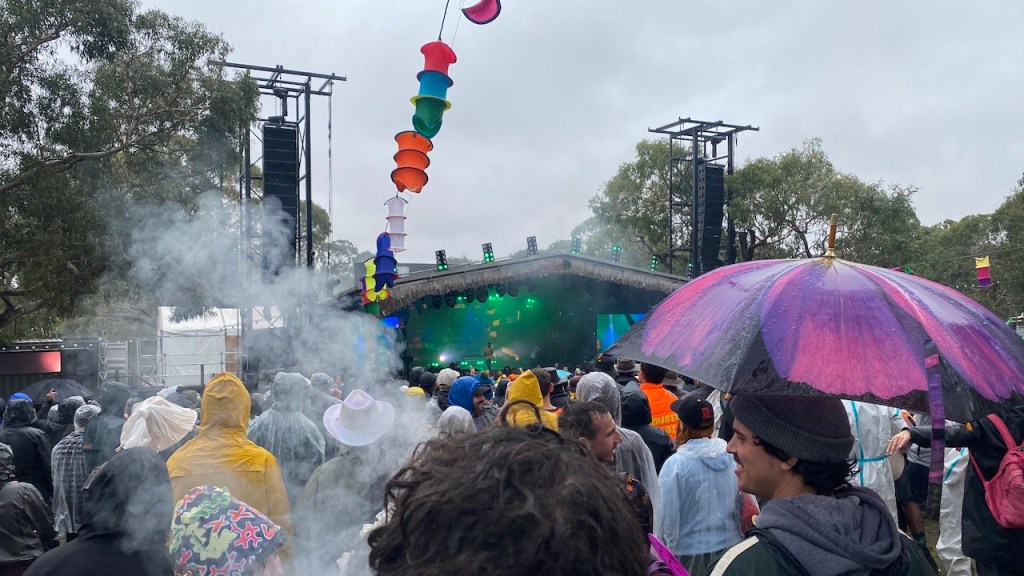
A feeling of collective euphoria tends to take hold of the ten-plus thousand people at Meredith come late afternoon on day two. Japanese producer Kuniyuki was the perfect candidate to induce this sensation, even if the grim skies above and the sodden ground underfoot didn’t match the producer’s loving, life-affirming sounds.
Before he’d played a note, Kuniyuki spoke about what an honour it was to be here. He praised the Meredith programmers for their indiscriminate attitude to genre, before picking up a flute and launching into an unpredictable journey through spiritual jazz, deep house and clubby techno. It was an injection of pure joy that left us with the motivation to carry on to the finish line.
The biggest act on this year’s lineup, Kraftwerk, delivered the most idiosyncratic performance of the weekend. Original member Ralf Hütter and his three touring companions walked on stage in black and white contoured body suits, taking their places behind synthesisers and lighting consoles outlined with neon lights.
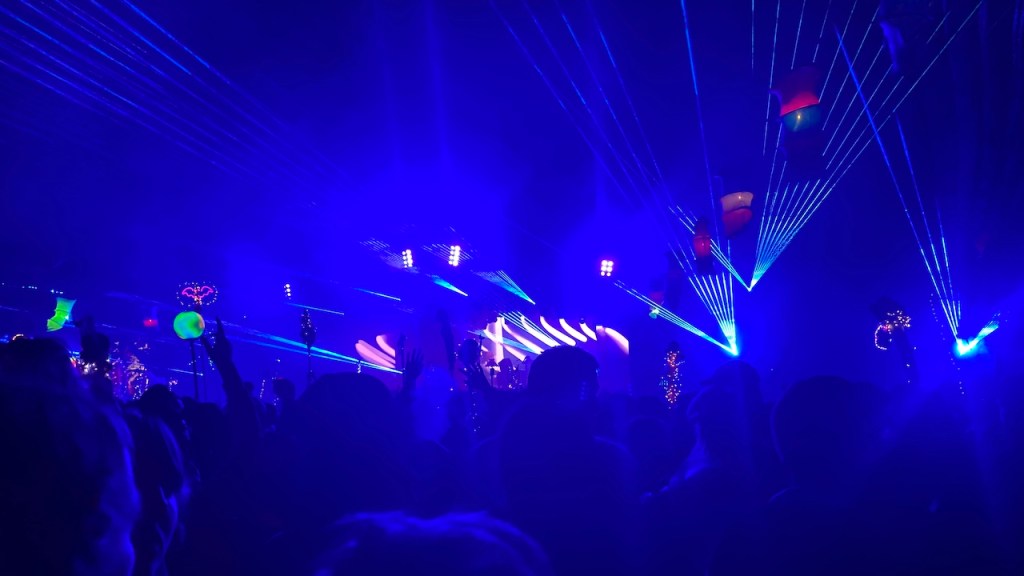
The group’s repertoire of techno-pop classics, including ‘Computer World’, ‘The Robots’ and ‘Autobahn’, doesn’t sound as daring and iconoclastic in 2023 as it would’ve in the 1970s, but the songs’ melancholic top-lines and ornamented musicality still cut through.
Are Sneaky Sound System anything more than a nostalgia act? Vocalist Connie Mitchell ensured the answer to this question was yes, projecting her powerhouse voice to all corners of the festival site as the duo dished out extended house music edits of their handful of crossover hits.
Milo Eastwood, of PBS FM’s The Breakfast Spread, carried on with the house music emphasis, fist-pumping at regular intervals throughout his extended DJ set. It was all feel-good bangers from Eastwood, including a surprise spin of Cut Copy’s ‘Lights & Music’ that took us back to Meredith 2011.
At some point, the rain ceased and the wind died down. It was warm in the amphitheatre. Bodies were in motion and faces bright and friendly. The crowd were there to offer assistance to anyone who needed it, while the glowing lanterns and a profusion of doofsticks helped us all stay oriented. Even at 4 AM, the view from the Meredith Eye showed many thousands of people acting on an impulse to make this moment count.
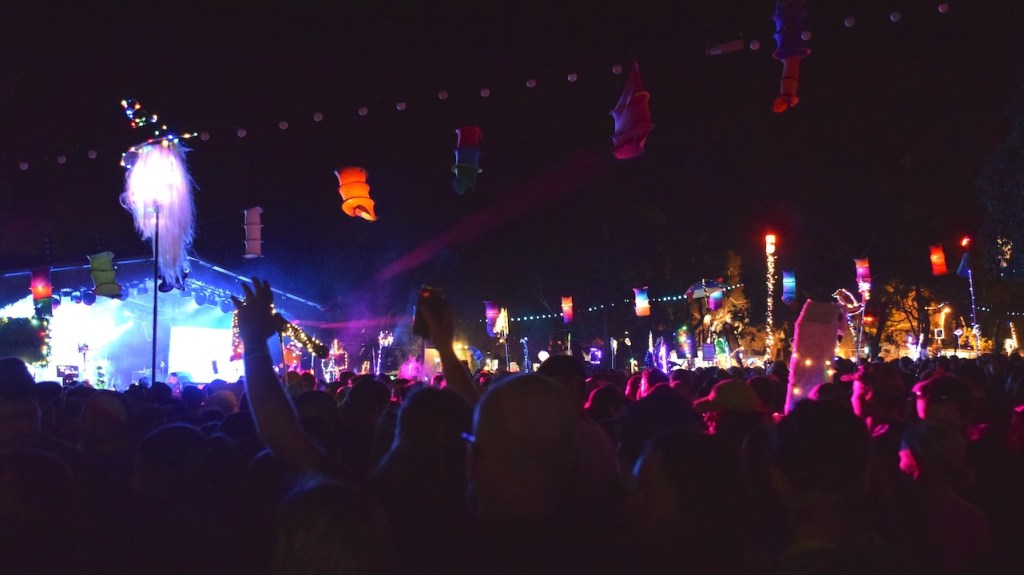
It remained overcast and dry on Sunday morning as Andrew Tuttle plucked his five-string banjo over a drone note, providing a mesmeric soundtrack to mid-morning coffee and fried breakfast meals. The Indigenous rock, blues and raggae band No Fixed Address were the pick of the weekend’s guitar bands. “We’re getting too old for this,” they said at one point. “But we still love it. You can’t fight the movements of the soul.”
This sentiment would’ve resonated with some of the people feeling worse for wear as they packed down their tents, deflated their air mattresses and contemplated the trip home. We came here because we love it; because it’s a safe space in which to let loose. The weather might’ve been less than ideal, but the integration of this temporary community was enough to overcome that blip.
In the course of the weekend, I heard many people speak about how they just want 2023 to be over, that this year has been especially taxing. To be present at festivals like Meredith is contingent on some kind of privileged access. But once here, you witness people’s essential urge to unite, to band together, and to surrender to the ancient power of live music.
Meredith Music Festival took place from Friday, 8th to Sunday, 10th December at the Meredith Supernatural Amphitheatre. Words by Billy Burgess, photos by Luke Costelloe.
Further Reading
Meredith Music Festival Review – Doofsticks, Neapolitan Disco and Pop Royalty
